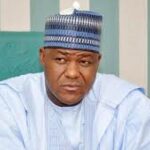A quiet revolution started in Lagos State on Monday, February 1, 2022. It should spread to other states, and if that happens the governors will be happy for it and for good. That will happen only if the political elite will have the ability to enforce it.
By the pronouncements of the state government, each bus driver in Lagos State is expected to pay N800 as a daily levy to the coffers of the state and will do so every day that he plies the streets and roads of the state.
- Senate okays bill barring Abuja landlords from collecting annual rent
- Monarch’s assassination: Return home, Ogun police beg fleeing residents
It is a tax and it is also a part of the payment for services being rendered by some agencies, such as the service of Lagos Waste Management Authority, which clears garbage at the motor parks. It is revenue to the state. It is aimed at imposing order on an important sector of the economy that has, ironically, been known for its proclivity for discord, chaos, thuggery, and social disruption. It is a sector that has long served as the breeder and supplier of cheap political gangs that serve the interests of the highest bidder, especially during election times.
Consequently, Nigeria’s road transport sub-sector, which is represented by the National Union of Road Transport Workers and other unions, has been hijacked by interest groups that serve and are in turn sustained by the powers whose purposes are not quite in sync with the good and welfare of the larger society.
The road transport sub-sector is multiples of the aviation sector and indeed larger than the seaports, especially when we put in perspective the fact that it is also the last mile that connects every other mode of transportation. Besides connecting cities and villages, it is also the form of transportation most used for intra-city movement. Indeed, one of the requirements of the modern economy is the provision of basic infrastructure, the foremost of which is a good road network that enables people and goods to move freely.
Besides the movement of people from one point to other for their social, cultural, religious and business functions, goods and services must be moved from points of production to multitudes of places where they are needed to satisfy human needs.
Thus, it is inconceivable to talk about the Gross Domestic Product of the economy in a year or any fraction thereof in the absence of a well-functioning transportation system. The haulage trucks plying the famous Lagos-Ibadan road; Lagos-Benin road; Abuja-Kaduna road and other highways, each transporting raw materials for the factories in the cities of their destinations, are carrying portions of our GDP. Just in the same way, the Danfos or Molues (the reformed ones now) running from Oshodi to Idumota, or the buses that ferry market women from one part of Benin City to another, are transporting part of the components of our GDP.
However, whether those components of the GDP eventually enter into the final computation of the figures at the end of the period depends on what happens in the transportation sector. Indeed, if we are saying there is very low tax revenue to GDP, this is why, because a good part of the GDP is not taxed for whatever reason it is and the focus on a few formal sectors in an economy that we know is largely informal tends to create imbalance and sometimes may destroy value.
When all these activities are done, the statisticians at the National Bureau of Statistics have a way of collating the information to tell us how much we produced in a year by giving us the monetary value of all the goods and services that we produced.
Sometimes things don’t just work smoothly. Occasionally there are disruptions in the transportation system within a town or state, sometimes violent ones. This could happen due to clashes between various factions of the NURTW. A good number of these clashes are money wars between rival factions. The transport sector has become such a gold mine but only the Agberos have so far discovered and taken advantage of it diligently or perhaps as some people say, some officials and godfathers share in the proceeds. The union imposes all manners of levies on transport operators, from Okada to buses, and “Keke-Marwa” or the tricycles.
This is the narrative that the Lagos State government has decided to change but it may seem that the unions want this levy to be additional payments as they seek to maintain the status quo on the collection of their various levies. Last July, a report by the International Centre for Investigative Report said that the Lagos Chapter of NURTW alone generates N123.08 billion yearly.
The ICJ report unearthed a highly organised and sophisticated network that sucks millions of naira daily from a chaotic road transport sector that barely renders a decent service to the customers. It puts a figure to tales told in buses and on the streets of Lagos, of how NUTRW officials live like kings by feeding fat on the levies they collect. The report covered 75,000 buses; 50,000 Keke Marwas and 37,000 Okadas. Operators of these vehicles are forced to pay, on a daily basis, N3,000, N600, and N1,800, respectively. In a year, according to that report, these levies came to N82.1 billion for buses; N8.1 billion for Keke Marwa, and N32.9 billion for Okada.
This is an avoidable or preventable haemorrhage from the economy of a state. What is not clear is whether Lagos State Government would be able to stop the routine Agbero collection and whether there are plans on how to take care of the security implication of such, as it is not going to be business as usual to tell these gangs to stop collecting what they have termed their rights and on which they enjoy luxuries, without giving them an alternative.
It is not clear if the Lagos State Government has alternatives for them and if the opportunity cost of this great policy has been duly considered and risk mitigated. It is not clear if the Lagos State Government would surrender to the wills of the union leaders who want to continue their daily taxes.
Given that apart from Lagos, Rivers and a few others, most of Nigeria’s states are barely surviving, unable to generate incomes to meet their basic needs, including the payment of their workers. Today, many state governments are owing their workers several months of unpaid salaries.
Yet, here is a gold mine that state governments can tap into to turn their fortunes and ensure their sustainability. In fact, this is the oil that every state has, especially the highly densely populated ones. The state can stem the tide by stepping in to bring order to the current chaos called road transport in Nigeria. Organising the road transport system also has great value in resolving some social issues and mitigating the menace of thuggery most seen in parks and on the roads. As a service, road transport is a critical element in our state and national economies that the time has come for it to be managed as a productive sector.
The choice is there for the governors to make. It is theirs to decide to organise this sector to become like manufacturing, banking or telecoms, or any other sector that is doing well and where the governments tax the operators to generate revenue.
The other choice, which has held sway and appears quite popular across the country, is to continue to retain it as a loose, fractious subterranean group that performs more roles than meet the eye.
Vincent Nwanma [email protected] 09059622071 (Text only)

 Join Daily Trust WhatsApp Community For Quick Access To News and Happenings Around You.
Join Daily Trust WhatsApp Community For Quick Access To News and Happenings Around You.


